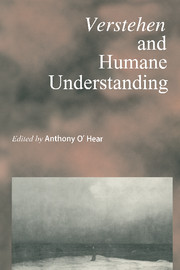Book contents
- Frontmatter
- Contents
- Notes on Contributors
- Preface
- ‘Two Cultures’ Revisited
- Rational and Other Animals
- Vico and Metaphysical Hermeneutics
- Three Major Originators of the Concept of Verstehen: Vico, Herder, and Schleiermacher
- Weber's Ideal Types as Models in the Social Sciences
- Verstehen, Holism and Facism
- Interpretation in History: Collingwood and Historical Understanding
- The Meaning of the Hermeneutic Tradition in Contemporary Philosophy
- Science and Psychology
- To Mental Illness via a Rhyme for the Eye
- Can There be an Epistemology of Moods?
- Feeling and Cognition
- Believing in order to Understand
- Data and Theory in Aesthetics: Philosophical Understanding and Misunderstanding
- Anti-Meaning as Ideology: The Case of Deconstruction
- Perictione in Colophon
- Index of Names
Anti-Meaning as Ideology: The Case of Deconstruction
Published online by Cambridge University Press: 17 May 2010
- Frontmatter
- Contents
- Notes on Contributors
- Preface
- ‘Two Cultures’ Revisited
- Rational and Other Animals
- Vico and Metaphysical Hermeneutics
- Three Major Originators of the Concept of Verstehen: Vico, Herder, and Schleiermacher
- Weber's Ideal Types as Models in the Social Sciences
- Verstehen, Holism and Facism
- Interpretation in History: Collingwood and Historical Understanding
- The Meaning of the Hermeneutic Tradition in Contemporary Philosophy
- Science and Psychology
- To Mental Illness via a Rhyme for the Eye
- Can There be an Epistemology of Moods?
- Feeling and Cognition
- Believing in order to Understand
- Data and Theory in Aesthetics: Philosophical Understanding and Misunderstanding
- Anti-Meaning as Ideology: The Case of Deconstruction
- Perictione in Colophon
- Index of Names
Summary
Don't look for the meaning; look for the use.
(Wittgenstein)A few years back the Yale deconstructionist Paul de Man was posthumously discovered to have written repeatedly for a Belgian collaborationist journal during the Nazi occupation. So far as I am aware, de Man in his American period espoused no particular politics. Indeed, the Left frequently regarded this as a cause for complaint, since most of them (to some extent rightly, as we shall see) thought of de Man and deconstruction as being their natural allies.
These revelations caused something like an academic equivalent of the Wall Street Crash, at any rate on the Left. Lesser luminary after lesser luminary joined a full-scale stampede out of deconstruction, post-structuralism and the rest, all anxiously protesting that they had never really believed it, that it was all old hat, even that they had always known that it was politically suspect. Had they been more honest, they might have seen that deconstruction for the most part had always been irrelevant to any straightforwardly activist politics, since those, being premised on the translatability of theory into practice, must depend on the assumption of a fairly close fit between words and the world. That is a relation, of course, which deconstruction and post-structuralism generally have been at pains to deny.
There is no precise definition or description of deconstruction. I should incline merely to call it a minor, localized swirl or vortex in the broader current of the Zeitgeist, since in its various usages it may mean any or all of the following: a semantic (or rather antisemantic) theory; an interpretative method; a generalized cultural outlook; or, at its widest, the entire order of things.
- Type
- Chapter
- Information
- Verstehen and Humane Understanding , pp. 253 - 286Publisher: Cambridge University PressPrint publication year: 1997



